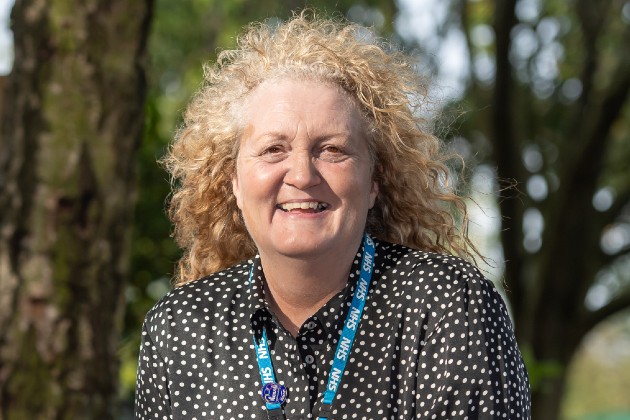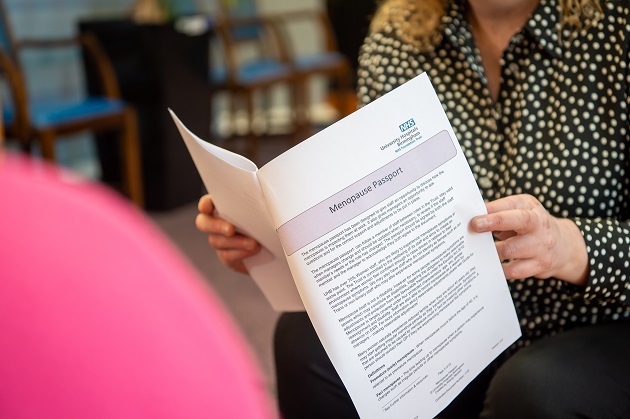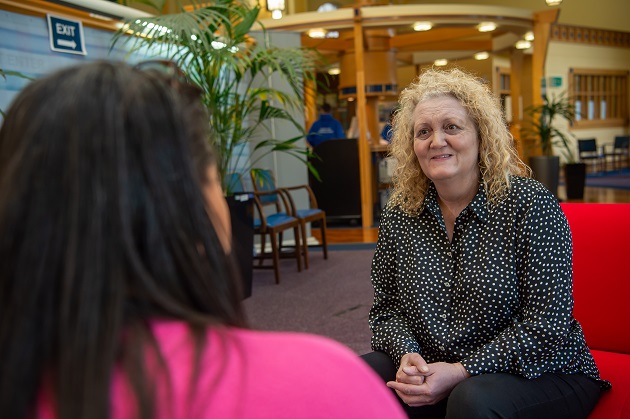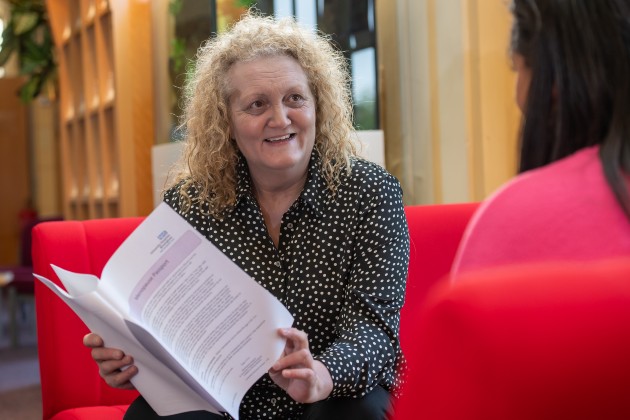Wendy Madden already knew she was helping her trust support and retain essential staff. But when she heard a nurse coming off the night shift shout from her car, “Wendy, I can’t thank you enough for the menopause passport,” it was clear that women now had the confidence to speak openly about something that was previously taboo.
Things hadn’t been this way for long. Wendy is now the nurse lead for menopause for University Hospitals Birmingham, but a few years ago, she experienced how little workplace support had been in place for women experiencing menopause symptoms.
“When I first had symptoms, I was grieving, having lost both my parents within 9 months of each other. So, my initial reaction was to ignore what was going on. Like many others, I just carried on,” she says. “But I knew I wouldn’t be the only one having such a hard time.”

As her oestrogen levels declined rapidly, Wendy’s brain fog intensified and had an increasing impact on how she felt she could perform her role. Her confidence plummeted and this experienced and knowledgeable nurse found herself unable to cope.
Wendy took 11 weeks off work to have cognitive behavioural therapy (CBT) and start hormone replacement therapy (HRT). Without this, and the support of her RCN officer, she says she may never have returned.
When she came back, she knew something had to change.
A passport to support
Armed with the knowledge that 75% of employees in the trust were female, including a considerable number who could be experiencing symptoms, Wendy approached the occupational health team and the inclusion network to ask what was being done to support women going through the menopause in the trust.
She then put herself forward to become chair of the trust's women’s network and trained to become an RCN health and safety rep to start turning her ideas into action.
It’s a chance for managers to listen and find out a woman’s individual needs
At a CEO fairness taskforce, Wendy told top execs that women needed better support. She proposed introducing a 'menopause passport' which could be used to initiate conversations. This was in addition to the peer-to-peer support groups and menopause champions Wendy had already brought into the trust.
Her idea was accepted without hesitation.
Personalised plan
Now Wendy’s menopause passport initiative provides a means for women and their managers to talk about the issue in a professional but sensitive way.
It’s a living document that allows a member of staff to have a structured conversation with their manager and agree reasonable adjustments to their working arrangements or environment. This could include changes to their uniform or flexible working.
“We had to take a personalised approach because each woman will have her own individual menopause journey. I didn’t want a huge document either – just something easy to use as a basis for a conversation with managers,” Wendy says.
“Women download the form, fill out their current symptoms and consider how they’re having an impact on their work. They use the document to discuss what appropriate support managers can give. It’s a chance for managers to listen and find out what a woman’s individual needs might be.”

The passport can be used by women of all ages experiencing the menopause, and by those who are non-binary. It also provides support for staff having treatment for breast cancer who are unable to take HRT.
It’s a portable document, it doesn’t go in a file, it stays with the individual so can be useful reminder to have with them when they see a GP too.
Getting support early helps people maintain confidence
Wendy says the passport is making a difference to the lives of many people: “Anxiety and imposter syndrome is a huge part of menopause. Using the passport can help reduce the likelihood of women being in a situation where they’re so worried about making a mistake they may choose not to come to work.
"Getting support in place early helps people maintain their confidence so they’re less likely to take sick leave or leave employment completely.”
It's good to talk
Wendy has ensured that women get peer-to-peer support too. She’s set up monthly support groups which have now been extended across 4 trust sites so women who were feeling isolated can discuss symptoms and solutions and find out what support is available.
They’re places to talk openly, knowing confidentiality will be respected.
“Whatever their experience of the menopause, everyone is welcome,” says Wendy.
While it’s hoped that the passport will help women get the right support and prevent them being performance managed because of their symptoms, the groups provide additional support. As a result, women are being referred to them by reps from a range of unions.
I had a supportive family, but not everyone has that
Wendy’s also spent time listening to other people’s experiences. “When the groups first started, some women still didn’t feel confident enough to raise their concerns and felt they wouldn’t be taken seriously. Others were still embarrassed to talk about it,” she says.
To address this, there are now menopause champions across the trust providing a listening ear and directing women to useful resources.
“They’re not menopause experts,” explains Wendy. “But they’re sympathetic and passionate about supporting women who are having a bad day with their menopause symptoms and just need someone to listen and signpost them to relevant information.
"This is important. I had a supportive family, but not everyone has that. We need to look out for these women.”
Going national
Wendy says she’s received excellent support for the initiatives from colleagues across the organisation and she stresses it isn’t just for nursing staff either. The domestic services manager has already worked through many passports with her staff.
Now the success of the passport has gone beyond trust boundaries.
“I’ve been contacted by other NHS organisations, NHS England, public health bodies and private sector organisations. I’ve even been interviewed about it by Elle Magazine in Italy,” she says.
Don't be afraid to speak out
Wendy’s now working on a short, animated film for managers, with an accompanying leaflet to help explain how her initiatives can be best used. This will be especially beneficial to those with no experience of menopause as it will cover how to approach the issue and ask questions sensitively.
If you want to set up something similar in your workplace, Wendy says you shouldn’t hesitate.

“Gather people's experiences and don't be afraid to speak out,” she says. “Talk to key people. That might be your health and safety rep, the wellbeing or inclusion team and the chief people person in your organisation.
“In every organisation, if you value and support your staff you will get back your investment tenfold. But it’s especially important in the NHS where staff retention is such a challenge. We simply can’t afford to lose these women’s valuable skills and organisational knowledge.”
Find out more
- World Menopause Day takes place on 18 October.
- Watch Wendy talking about her role as an RCN health and safety representative and the importance of the menopause passport.








